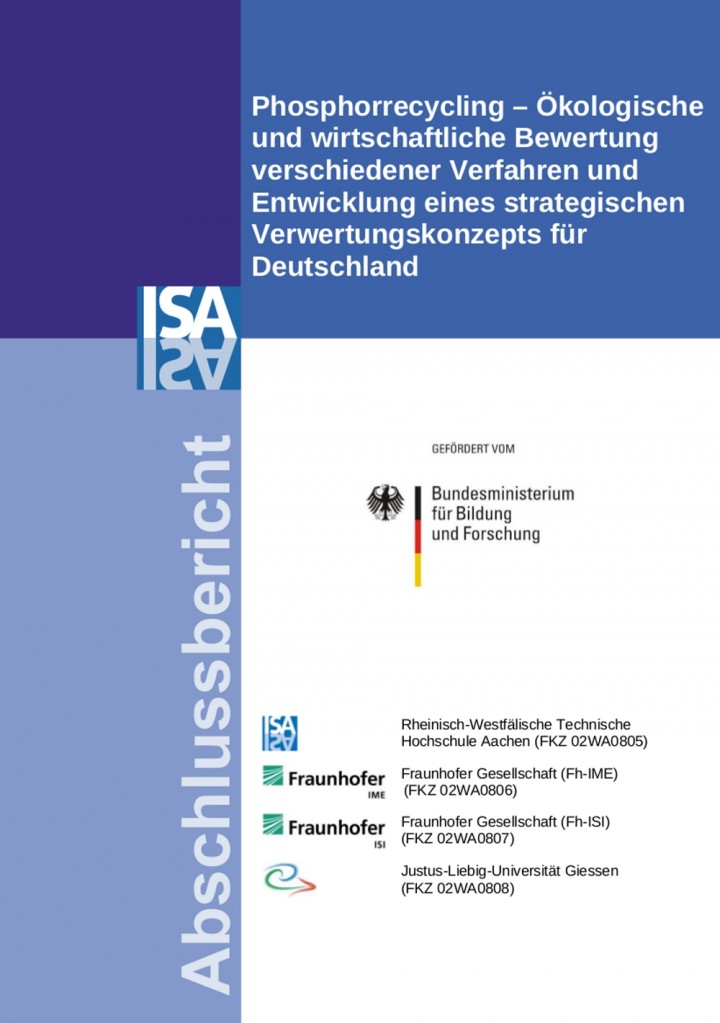Phosphorrecycling – Ökologische und wirtschaftliche Bewertung verschiedener Verfahren und Entwicklung eines strategischen Verwertungskonzepts für Deutschland (in German) - Recycling of phosphorus - Ecological and economic evaluation of different processes and development of a strategical recycling concept for Germany
Pinnekamp, J. et al. (2011)

Published in: 2011
Pages: 463
Publisher:
Rheinisch-Westfälische Technische Hochschule Aachen, Fraunhofer Gesellschaft, Justus-Liebig-Universität Giessen, Germany
Author:
Pinnekamp, J. et al.
Uploaded by:
danijela milosevic
Partner profile:
common upload
9480 Views
90 Downloads
Location of library entry
Content - Summary
The accompanying project PhoBe had two objectives. The first was to evaluate the processes being developed within the other projects of the funding initiative with regard to their technical, economical and ecological feasibility. In a second step the generated products were investigated with a focus on their usability, fertilizing quality, plant availability as well as their nutrient and pollutant potential.
Phosphorus is essential for the production of fertilizers and cannot be substituted in agriculture. Therefore it can be assumed that
an increase in its price will only lead to a minor decrease in demand. Because of the increasing demand especially in Southeast
Asia there will likely be a stronger competition for raw phosphorus and phosphoric acid in the future. For that reason a recycling of
phosphorus from the various material flows that exist in communal wastewater treatment plants seems an appropriate option. The
economic efficiency of the recycling processes is linked to the concentration of phosphorus in the material flow as well as the use
of personnel and equipment and the investment costs. All processes which have been investigated within this project cannot be
run economically efficient yet. However a cost neutral operation is already possible due to positive side effects on the wastewater
treatment plant e.g. improvement of dewaterability. An ecological assessment of the developed processes shows that a relevant
amount of the phosphorus can be used without the negative effects that occur when directly applying sewage sludge onto the
fields. Pollution and acidification of the soil can be avoided by the use of these processes. At the same time they do not lead to a
relevant additional pollution. With regard to phosphorus recovery, and in case thermal disposal of sewage sludge will be the
preferred method in the future, investment in separate sewage sludge incineration plants should be undertaken. Principally huge
centrally located plants are more cost effective in construction and operation. Nevertheless small decentral plants can also be
economical depending on the catchment are. A complete change towards separate sewage sludge incineration will not be
practicable in the near future. However phosphorus recovery plants could already be built at big wastewater treatment plants
(>100,000 PE).
The investigations made in the PhoBe project clearly show that the generated secondary raw materials are already a comparable
alternative to commercial mineral fertilizers like Triple-Superphosphate. With the developed processes the concentration of
phosphorous could be highly increased in comparison to the source materials. At the same time there is also a relevant reduction
in the concentration of heavy metals. According to the results of an enguiry, experts believe in the cost-efficient use of phosphorus
recovery in industrialised countries until 2030.
++++++++++
In German:
Das Projekt PhoBe „Phosphorrecycling - Ökologische und wirtschaftliche Bewertung
verschiedener Verfahren und Entwicklung eines strategischen Verwertungskonzepts für
Deutschland“ ist in die BMBF/BMU Förderinitiative „Kreislaufwirtschaft für Pflanzennährstoffe,
insbesondere Phosphor“ mit dem Ziel eingegliedert, die Ergebnisse der einzelnen
Projekte innerhalb der Förderinitiative zu verknüpfen und vergleichend zu bewerten.
Das PhoBe Projekt ist in sieben Arbeitspakete unterteilt:
- Analyse der Preisentwicklung für Phosphat
- Ermittlung und Bilanzierung der zur Phosphorrückgewinnung geeigneten Stoffströme
in Deutschland
- Untersuchungen der in der Förderinitiative erzeugten Produkte
- Kostenabschätzung und ökobilanzielle Bewertung der in der Förderinitiative
entwickelten Verfahren
- Entwicklung eines Rückgewinnungskonzepts für Deutschland
- Technologievorausschau für Phosphatrecyclingtechnologien
- Zukunftschancen durch Entwicklung von Phosphorrecyclingtechnologien für
Deutschland
Bibliographic information
Pinnekamp, J. et al. (2011). Phosphorrecycling – Ökologische und wirtschaftliche Bewertung verschiedener Verfahren und Entwicklung eines strategischen Verwertungskonzepts für Deutschland (in German) - Recycling of phosphorus - Ecological and economic evaluation of different processes and development of a strategical recycling concept for Germany. Rheinisch-Westfälische Technische Hochschule Aachen, Fraunhofer Gesellschaft, Justus-Liebig-Universität Giessen, Germany
Filter tags
Europe & Central Asia German















